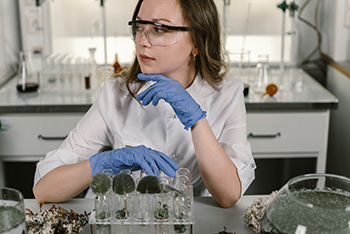Finding Biochemistry Jobs: The Ultimate Guide
Do you want to work in the biochemistry field? If so, you’re in luck! This is a booming industry that offers many opportunities for career growth. In this guide, we’ll discuss what biochemistry is and what kinds of jobs are available in this field.
We’ll also provide tips on how to break into this career path and what kind of education you need to succeed. So whether you’re just starting out your career journey or you’re looking to switch gears, read on for all the information you need to get a job as a biochemistry major!
What is Biochemistry?
Biochemistry is the study of the chemical processes that occur in living organisms. This includes all aspects of metabolism, from the smallest biochemical reactions to the most complex ones. Biochemistry is a life science that combines biology and chemistry, and it’s one of the most popular majors at universities around the world.
What Skills Do I Need?
In order to be a successful biochemist, you will need the following skills:
– A bachelor’s degree in biochemistry, biology, and/or chemistry
– Strong analytical skills
– The ability to conduct basic research
– Excellent communication skills
– The ability to work independently
– Strong critical thinking skills
– The ability to work well under pressure
You don’t need a masters degree or doctoral degree to get your foot in the door. If you have these skills and at least a bachelor’s degree then you’re well on your way to getting a job in biochemistry!
Whether you want to become a research scientist, science writer, or biomedical engineer, there’s a perfect biochemistry job out there for you!
How Do I Get Started?
Biochemistry is a fascinating field that can lead to a rewarding career. With the right education and experience, you can find a job in biochemistry that suits your skills and interests. The best way to get started in biochemistry is to get a degree in the field.
How To Get Graduate Degrees in Biochemistry
There are many different ways to get a biochemistry degree. You can attend a traditional four-year university, or you can choose to study online. You can also get a degree from a two-year community college.
Associates Degree
A two-year associate’s degree in biochemistry is a good option if you’re looking to get started in the field quickly. This type of degree will give you the basic knowledge and skills you need to begin your career.
Bachelor’s Degree
A bachelor’s degree in biochemistry will give you the basic knowledge you need to get started in your career. You can also consider getting a master’s or Ph.D. in biochemistry if you’re interested in pursuing a more research-oriented career.
Master’s Degree
A master’s degree in biochemistry will give you advanced knowledge of the subject and prepare you for a career in research or academia.
Ph.D.
A Ph.D. in biochemistry will prepare you for a career in research or academia. You’ll also be able to pursue a career in the industry if you’re interested in that field.
A bachelor’s degree and some experience are usually enough to get entry-level positions when it comes to biochemistry jobs. However, if you want to pursue a more research-oriented career, you will need to get a master’s degree or a Ph.D. in biochemistry.
Once you have your biochemistry degree, you will need to gain experience in the field.
Becoming a Biochemistry Major
Most biochemistry programs are offered at the undergraduate level. A few schools offer biochemistry degrees at the graduate level, but most biochemists have a bachelor’s degree in biochemistry or a related field.
To become a biochemistry major, you’ll need to take courses in life sciences; biology, chemistry, physics, and math. Biochemistry majors typically go on to careers in the pharmaceutical industry, biotechnology, or academia.
If you’re interested in a career in biochemistry, then you should definitely consider pursuing a biochemistry degree. Biochemistry majors have a lot of job opportunities available to them, and they are very well-paid.
How Much Money Can I Expect To Make?
According to the Bureau of Labor Statistics, the median annual wage for biochemists is $94,500. The lowest ten percent earn less than $47,470, and the highest ten percent earn more than $144,760.
Those who obtain biochemistry degrees often have more profitable occupations. However, it is important to keep in mind that biochemists with higher levels of education and experience usually earn the highest salaries.
Biochemistry Jobs
There are many different types of jobs available to biochemistry majors, so it’s important to find one that’s a good fit for your skills and interests.
Some examples include:
Teaching
If you enjoy teaching, you can use your biochemistry knowledge to teach others. You can find biochemistry jobs at community colleges and universities. In the role of a college professor, you’ll be responsible for teaching students about biochemistry concepts, grading papers, and conducting research projects.
????- Median Annual Wage: $75,430
Research Positions
In this role, you would conduct experiments and analyze data to contribute to our understanding of biochemistry. Research assistant and research associate positions are available in academia and industry.
????- Median Annual Wage: $60,370
Sales and Marketing
Looking for a career that involves biochemistry but doesn’t involve research? You may want to consider sales and marketing. In this job, you’ll be responsible for promoting and selling products.
You’ll need to be able to understand the science behind the products, and you’ll also need to be able to communicate this information to potential customers. If you’re interested in this type of job, you should consider looking into biotechnology companies or pharmaceutical companies.
????- Median Annual Wage: $60,000
Medical Positions
You could use your biochemistry expertise to diagnose and treat patients as a doctor or develop new drugs as a pharmacist. You can also work as a medical researcher to develop new treatments for diseases.
????- Median Annual Wage: $208,000
Industrial Jobs
There are also many biochemistry jobs available in the industry sector. You could work in quality control, making sure that products meet safety standards, or use your biochemistry skills to develop new products.
????- Median Annual Wage: $66,000
Product Development Positions
If you’ve got a background in biochemistry, but you’re not interested in research, you can become a product development chemist. You’ll be responsible for developing new products and formulations and also for testing products and ensuring that they meet safety standards.
????- Median Annual Wage: $103,390
Science Journalists
If you’re interested in biochemistry and writing, you can become a science journalist. You’ll be responsible for writing articles about biochemistry, interviewing scientists, and staying up-to-date on the latest discoveries. If you’re interested in biochemistry and communicating with the public, this is the job for you!
????- Median Annual Wage: $62,000
No matter what type of biochemistry job you’re interested in, there are many options available to you. With hard work and dedication, you can achieve your goals and land the job of your dreams!
What Field Interests You The Most?
When you’re looking for biochemistry jobs, it’s important to find a field that interests you. That way, you’ll be more likely to enjoy your work and excel in your career.
For example, if you’re interested in environmental issues, you might want to look for biochemistry jobs in the environmental sector. Or, if you’re interested in research, you might want to look for biochemistry jobs in the pharmaceutical industry.
There are many different types of biochemistry jobs available, so it’s important to find one that’s a good fit for your interests and skills.
Molecular Biology
Molecular biology is another area of biochemistry that you can pursue. In this field, you’ll study the structure and function of genes. You’ll also learn about how DNA is replicated and how proteins are made. This knowledge is important for developing new treatments for diseases.
Biochemistry and Molecular Biology
Biochemistry and molecular biology (BMB) is the study of the chemical processes that occur within living cells. It covers a wide range of topics, from DNA and proteins to carbohydrates and lipids. BMB is a great choice for students who are interested in both biology and chemistry.
Biological Technician
Biological technicians help biologists and other scientists with their research. They may collect samples, run laboratory tests, and record data. Some technicians may also help develop new products or processes. To become a biological technician, you usually need an associate’s degree in biochemistry or a related field.
Biological Sciences
If you’re interested in biochemistry but want to explore other areas of biology as well, you should consider studying biological sciences. This field covers a wide range of topics, including cell biology, ecology, and evolutionary biology. You’ll gain a broad understanding of the living world and how it works.
Biomedical Engineering
Biomedical engineering is another career option that combines biochemistry with engineering. As a biomedical engineer, you’ll use your knowledge of biochemistry to design and create new medical devices. Biomedical engineers could also work on developing new methods for treating diseases.
Biomedical Research
You could work in a laboratory, conducting experiments and researching new treatments for diseases.
If you’re interested in working with patients, you could become a clinical biochemist. In this role, you would use your knowledge of biochemistry to diagnose and treat patients with medical conditions.
You could also work in sales or marketing for a biochemistry company, or you could become a biochemistry teacher at a college or university.
Conduct Research Projects
If you’re interested in conducting research, you can find biochemistry jobs at both universities and hospitals. In this type of job, you’ll be responsible for conducting experiments, collecting data, and researching new drugs and treatments.
You’ll also be responsible for writing papers and presenting your findings at conferences. If you’re interested in this type of job, you should consider working for a government agency or a private research organization.
In this career, you’re able to use your biochemistry skills to make a difference in the world.
Biochemical Engineering
If you’re interested in a more hands-on approach, you may want to consider a career in biochemical engineering. As a biochemical engineer, you’ll be responsible for designing and developing new products and processes.
You’ll also be responsible for testing new products and processes, as well as troubleshooting problems. If you’re interested in this type of job, you should consider working for a biotechnology company or a pharmaceutical company.
Food Science
Another option for those with a biochemistry degree is to work in food science. In this field, you’ll use your biochemistry knowledge to help develop new food products and improve existing ones. You may also be responsible for testing new food products and conducting research on food safety. If you’re interested in this type of job, you should consider working for a food company or a government agency.
Chemical Engineering
Want to be in charge of designing and developing new products? Then you should consider this career path. In this job, you’ll be responsible for designing and testing new chemicals and drugs. You’ll also be responsible for overseeing the production of these chemicals. If you’re interested in this type of biochemistry job, you should consider working for a pharmaceutical company.
Computer Science
If you’re intrigued by the idea of developing new software or applications, you should consider this career path. In this job, you’ll be responsible for developing new algorithms and programming code. You’ll also be responsible for testing and debugging these programs. If you’re interested in this type of biochemistry job, you should consider working for a software company.
Government Agencies
Have you ever thought about working for the government? There are biochemistry jobs available. You could work for the Department of Defense or the National Security Agency. You could also work for the Centers for Disease Control and Prevention or the Food and Drug Administration. If you want to work for a government agency, you should search for Biochemistry Jobs on the USAJOBS website.
Biochemistry jobs are out there waiting for you. All you need to do is have at least a bachelor’s degree and search for Biochemistry Jobs near you on Finding Careers!
Job Outlook For Biochemists
The job market for biochemists is expected to grow by 30% from 2016 to 2026, according to the U.S. Bureau of Labor Statistics. This growth is due in part to the increasing demand for new and improved pharmaceuticals and biotechnology products.
So if you’re looking for a stable and growing career, biochemistry is a great option! Whether you’re interested in working for pharmaceutical companies, oil and gas companies, or government agencies, there are plenty of opportunities available as long as you’ve got a bachelor’s degree in biochemistry.
New Job Alert!
Don’t forget to sign up for our job alert service to receive the latest biochemistry jobs straight to your email inbox or mobile phone. The early bird gets the worm, never miss out on another job opportunity again!





